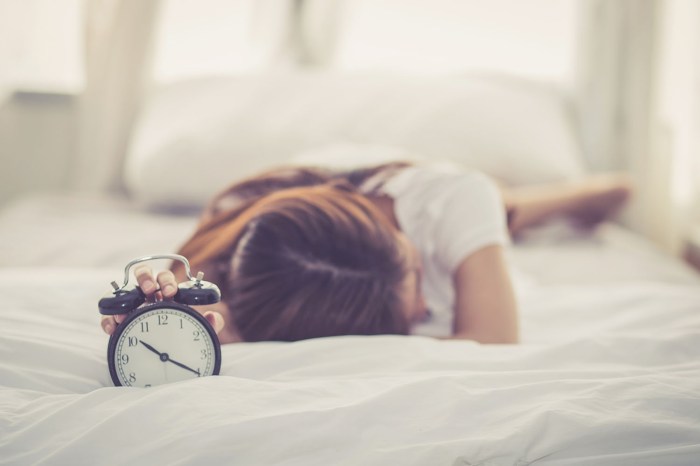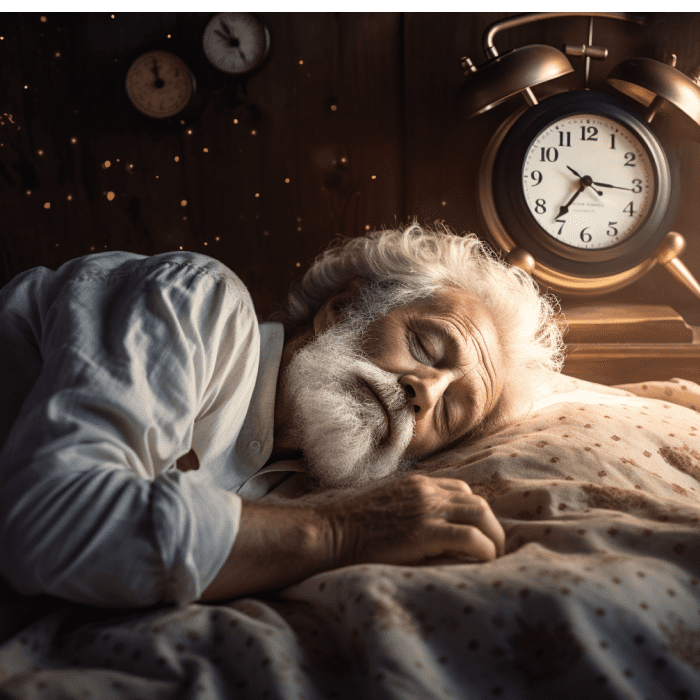
If sleep were a superhero, it would be the undisputed champion of health and wellness, swooping in to save the day while we snooze! Sleep quality is no mere bedtime story; it’s the secret ingredient behind glowing skin, sharp minds, and a robust immune system. As we dive into the land of slumber, we’ll discover how our nightly adventures—or misadventures—can make or break our well-being.
From the relationship between sleep and mental health to the surprising effects on our skin and immunity, sleep quality is the unsung hero of our daily lives. Struggling with puffiness or chronic conditions? Fear not! We’ll cover how to transform your night into a rejuvenating escapade that leaves you refreshed and ready to conquer the world—one pillow at a time.
Sleep Quality and Overall Health
Sleep is often seen as the ultimate luxury in today’s fast-paced world, but it’s more like your body’s nightly spa treatment, crucial for overall health. Quality sleep is not just about counting sheep; it’s a vital ingredient in the recipe for a healthy and happy life. Imagine your brain as a computer that needs rebooting every night to function optimally; without that rest, it can crash harder than a Windows 95 machine after too many pop-up ads.
Mental Health and Sleep Quality
The connection between sleep quality and mental health is as strong as a double espresso on a Monday morning. Poor sleep can lead to heightened anxiety, depression, and irritability, creating a vicious cycle where mental health issues further compromise sleep quality. When the brain doesn’t get enough quality rest, it can’t properly regulate mood and emotions, much like trying to bake a soufflé with expired ingredients.
Studies have shown that people with insomnia are ten times more likely to develop depression, emphasizing the importance of those nightly Zzz’s.
Impact of Sleep on Physical Health and Immune Function
Sleep acts as a powerful immune booster, akin to a superhero cape for your body. Quality sleep supports various physiological functions and helps maintain a strong immune system. When you skimp on sleep, your body’s ability to fend off infections diminishes, making you feel like a sitting duck in a shooting gallery. Research indicates that those who get less than seven hours of sleep are three times more likely to catch a cold than those who prioritize their shut-eye.
This happens because sleep helps produce cytokines, proteins that combat infection and inflammation.
Effects of Poor Sleep on Chronic Conditions
The dark cloud of poor sleep looms large over chronic conditions like diabetes and heart disease. Poor sleep can wreak havoc on insulin sensitivity, making it harder for the body to manage blood sugar levels, which is a red flag for diabetes. In fact, a study published in the journal “Diabetes Care” found that sleep deprivation could lead to a 23% increase in the risk of developing type 2 diabetes.
Similarly, the heart isn’t a fan of sleep deprivation; studies suggest that insufficient sleep can lead to high blood pressure, increased stress levels, and inflammation, all of which are major culprits behind heart disease.
“Sleep is the best meditation.” – Dalai Lama
In summary, sleep quality is crucial not just for a good mood but also for a well-functioning, healthy body. The next time you’re tempted to binge-watch that series instead of hitting the hay, remember: quality sleep is your secret weapon against illness, stress, and mood swings. So, tuck yourself in and let your body do the magic of healing while you dream of unicorns and rainbows.
Sleep Quality and Skin Care

Sleep is like a magical elixir for our skin. It’s during those precious hours of slumber that our skin gets a chance to repair itself, rejuvenate, and prepare for the next day’s adventures. If you’ve ever wondered why you look like a snack after a full night’s rest, it’s because your skin is busy working hard while you dream of unicorns and rainbows.
Let’s dive into how sleep quality impacts skin health and what you can do to keep your complexion glowing like a freshly polished apple.
Impacts of Sleep on Skin Health and Appearance
A good night’s sleep can transform your skin from drab to fab, while poor sleep can leave you looking like you just ran a marathon in the Sahara Desert. Lack of sleep can lead to increased stress hormones like cortisol, which may result in breakouts, dullness, and even premature aging. Your skin relies on sleep to boost collagen production, repair damage, and maintain hydration levels.
Think of sleep as your skin’s BFF, always there to lend a hand (and a lot of moisture) when needed. Here are some key points about how sleep and skin health are intertwined:
- Decreased inflammation: Quality sleep helps reduce redness and puffiness, giving your skin a calm and collected vibe.
- Enhanced hydration: Your skin can absorb moisture better at night, leading to a plump and dewy glow.
- Fewer dark circles: Quality sleep prevents those pesky bags under your eyes from auditioning for a role in a horror movie.
- Improved elasticity: Sleep allows your skin to repair itself, maintaining its firmness and preventing sagging.
Skincare Routine Enhancing Skin Quality at Night
A nighttime skincare routine is like tucking your skin into bed with a cozy blanket. It’s essential to create a regimen that not only cleanses but also nourishes and rejuvenates your skin while you sleep. Here’s a step-by-step guide to an effective nighttime skincare routine that enhances skin quality:
- Cleanse: Start by washing away the day’s grime, makeup, and stress. A gentle cleanser will do the trick, leaving your skin fresh and ready for action.
- Exfoliate: A few times a week, use a mild exfoliant to slough off dead skin cells. This allows your skincare products to penetrate deeper and work their magic.
- Tone: Apply a hydrating toner to balance your skin’s pH levels and prep it for the following products.
- Serum: Choose a serum packed with active ingredients like hyaluronic acid or retinol to target specific concerns while you snooze.
- Moisturize: Seal in the goodness with a rich night cream or oil that locks in moisture and helps your skin repair itself overnight.
- Eye cream: Don’t forget the delicate eye area. A nourishing eye cream can work wonders while you dream.
Methods to Prevent Sleep-Related Skin Issues
Even the best of us can experience sleep-related skin issues, like puffiness that could rival the Michelin Man or acne that seems to have an audition for the next blockbuster. But fear not! There are some easy methods to keep your skin looking its best while you catch those Z’s:
- Sleep on your back: This position reduces pressure on your face, helping to prevent those sleep lines that can become permanent roommates.
- Use a silk pillowcase: Silk is gentler on your skin than cotton, helping to reduce friction and prevent breakouts.
- Stay hydrated: Drink plenty of water throughout the day to keep your skin hydrated and plump, so it doesn’t feel like the Sahara by morning.
- Limit screen time: Reduce exposure to blue light before bed to improve sleep quality, which in turn helps your skin repair itself.
“A good laugh and a long sleep are the best cures in the doctor’s book.” – Irish Proverb
Sleep Quality and Wellness Practices

In the quest for the perfect snooze, wellness practices can be your trusty sidekicks, much like a superhero team ready to battle insomnia. Imagine soothing spa treatments, calming yoga sessions, and a magical list of supplements that join forces to elevate your sleep quality. Together, they can transform your nightly routine from a restless auto-pilot into a serene, dreamy voyage!
Spa Treatments and Sleep Quality
Indulging in spa treatments is akin to giving your body a warm hug and telling it, “Hey, you deserve some serious pampering!” Spa therapies, such as massages, aromatherapy, and hydrotherapy have been found to significantly enhance sleep quality. Massage therapy, in particular, not only loosens those tight muscles but also stimulates the production of serotonin, paving the way for melatonin—the hormone that welcomes sleep like an old friend.
Imagine floating in a warm, bubbly hot tub with lavender essential oil wafting through the air—the very essence of relaxation! Hydrotherapy can decrease muscle tension and promote relaxation, while aromatherapy wraps you in a fragrant cocoon, sending you off to dreamland. When you leave the spa, you’re not just refreshed; you’re practically a sleep ninja, ready to conquer the night!
Yoga and Sleep Promotion
Yoga isn’t just about fancy poses and Instagram-worthy mats; it’s a sleep superhero in disguise! Practicing yoga helps to quiet the mind, reduce anxiety, and stretch out the knots of tension built up over the day. Incorporating gentle yoga routines into your evening ritual can significantly improve your sleep quality. The magic of yoga lies in its breathing techniques, which act as lullabies to your nervous system.
Poses like Child’s Pose and Legs-Up-The-Wall help lower cortisol levels and encourage relaxation. So, if you find yourself tossing and turning, try striking a pose (not the celebrity kind), and let your worries melt away.
Supplements Supporting Sleep Quality
When it comes to sleep-enhancing supplements, think of them as your friendly neighborhood sleep aids—each with its own unique powers to help you drift off. Here’s a fabulous lineup of supplements that can lend a hand in achieving peaceful slumber:
- Melatonin: This hormone regulates sleep-wake cycles and can be particularly useful for adjusting to new time zones or combating sporadic sleep schedules.
- Magnesium: Promotes relaxation by calming the nervous system and aiding muscle recovery, making your body feel like a cozy blanket at bedtime.
- L-Theanine: Found in tea leaves, this amino acid soothes the mind, helping you feel calm and ready for dreamland.
- Valerian Root: Known for its sedative properties, this herbal supplement has been used for centuries to promote relaxation and improve sleep quality.
- Chamomile: Often enjoyed as a tea, chamomile has mild sedative effects that can help ease you into a peaceful sleep.
These supplements can be the missing puzzle pieces in your sleep quality journey. Just remember to consult with a healthcare professional before diving into any supplement regimen to ensure it fits your unique sleep needs like a glove!
Conclusion
In conclusion, sleep quality is not just a matter of counting sheep; it’s about waking up to a life brimming with vitality and joy. Whether you’re indulging in a soothing spa treatment, stretching your way into dreamland with yoga, or arming yourself with sleep-friendly supplements, every step you take toward better sleep can lead to a happier, healthier you. So, tuck yourself in, let the dreams come alive, and remember: life is too short to skimp on beauty sleep!
FAQs
What are the signs of poor sleep quality?
Common signs include daytime fatigue, irritability, difficulty concentrating, and waking up feeling unrefreshed.
How many hours of sleep do I need for optimal sleep quality?
Most adults require 7 to 9 hours of quality sleep per night for optimal health and functioning.
Can napping improve sleep quality?
Yes, short naps can enhance alertness and reduce fatigue, but long naps may interfere with nighttime sleep.
Do sleep environments affect sleep quality?
Absolutely! A dark, quiet, and cool environment promotes better sleep quality.
Can I improve sleep quality with diet?
Yes, a balanced diet rich in sleep-friendly foods—like cherries, bananas, and whole grains—can enhance sleep quality.





